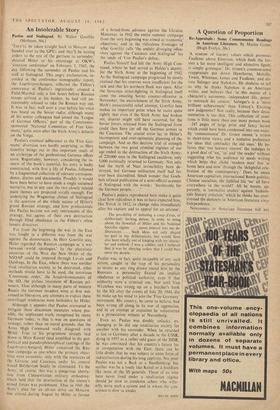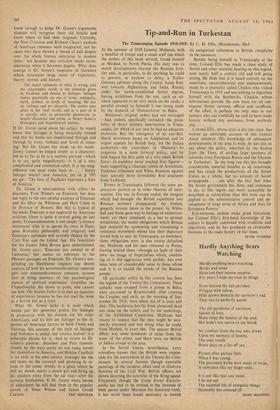A Question of Proportion
Re-Appraisals : Some Commonsense Readings in American Literature. By Martin Green. (Hugh Evelyn, 30s.)
'A SCHEME of literary values which promotes Faulkner above Emerson, which finds the for- mer a far more intelligent and attractive figure, is simply grotesque.' Dr. Green's common-sense reappraisals put down Hawthorne, Melville, Twain, Whitman, .James and Faulkner, and ele- vate Salinger and Nabokov. He disdains to tell ..us why he thinks Nabokov is an American' writer, and believes that 'in this matter of a character's autonomy, independent life, power to outreach his creator,' Salinger's is a 'more brilliant achievement' than Tolstoy's. Exciting' new judgments? Not really, because their docu- mentation is too thin. This collection of -asser- tions is little more than one more protest book ---- 247 pages of large print and fancy layout which could have been condensed into one essay. By 'commonsense' Dr. Green means 'a return to short-term views, and a tentative preference for ideas that contradict the old ones.' He be- lieves that 'our keenest interest' (be indulges in a good deal of 'we,' us' and 'the reader' without suggesting who his audience is) needs. writing which helps that cliche 'modern man' live 'at home here and now' through the 'delightful cele- bration of the contemporary.' Does he mean American capitalism, international Bomb politics, Chinese socialism, the fulfilled life 'we' all have everywhere in the world'? All he means, ap- parently, is 'corrective studies' against 'fashion- able literary criticism,' which he thinks has over- stressed the darkness in American literature since Independence.
Newcomers to American literature will not know enough to judge Dr. Green's arguments; students will recognise these old attacks and know where to find their originals. Certainly, the New Criticism and Richard Chase's analysis of American romance need reappraisal, not be- cause they have thrown a 'mood of dull despair over the whole literary enterprise in modern times,' but because any criticism needs recon- sideration when it becomes dogma. What does emerge is Dr. Green's suspicion of literature which articulates large areas of experience, theory, morals and history :
The major symptom of what is wrong, and the catastrophic result, is the attention given to Faulkner and denied to Salinger. Salinger makes practically no use of irony, ambiguity, myth, symbol, or levels of meaning. He has no violence and no obscurity. His stories take place in the 'real' world, and in a part of it as socially safe, as pictorially glamorous, as largely discursive and polite, as Henry James's (European and hypothetical) milieux.
If Dr. Green cared about his subject he would know that Salinger is being massively treated and that his books are conditioned through and through by irony, violence and 'levels of mean- ing.' But Dr. Green has made up his mind : Zooey 'cannot be judged simply as a character; but in so far as he is a realistic portrait—which is to say, quite magnificently—it is of a very complicated and committed adult. It is the mag- nificence one must come back to. . . .' Surely Salinger doesn't love America; yet on p. 195 we get : 'The love of Faulkner expresses a hate of America.'
Dr. Green is unscrupulous with critics—he discounts Yvor Winters on Emerson, but does not reply to the two careful analyses of Emerson and his effect on Whitman and Hart Crane in In Defence of Reason. But this is typical, of the book. Emerson is not neglected by American criticism (there is quite a revival going on just now); Transcendentalism is not simply 'a literary movement' (this is to ignore its roots in Euro- pean Romantic philosophy and religion); and Emerson's optimism was severely shaken by the Civil War and the Gilded Age. His fanaticism for the fanatic John Brown goes unmentioned. Dr. Green says: 'Emerson can remind us of Lawrence,' but makes no reference to the Phoenix passages on Emerson. Dr. Green's axe- grinding on Hawthorne neglects any decent analysis cf how his seventeenth-century material gets into nineteenth-century romance, accuses him of being unaware of 'the psychological aspects of spiritual experience,' simplifies the Unpardonable Sin down to pride, and cannot see how The Scarlet Letter is in fact an equation of experiences because he has not read the book as a fiction but as a tract.
What Dr. Green lacks is a scale which would put his generous praise for Salinger in proportion with his distaste for his other Americans, and let him see Salinger as the in- heritor of American factors in both Twain and Thoreau. His account of the style of Salinger and Nabokov is useful, but 'rococo realism' is a miserable phrase for it. And to return to Dr. Green's premise: Humbert and Pnin (unmen- tioned, by the way) surely do not make homes for themselves in America, and Holden Caulfield is an exile in his own society, nostalgic for the old tunes on the carousel and planning to re- 'treat to the sunny woods, to a place where he will act dumb, marry a dumb girl and bring up his children away from the rat race—after his nervous breakdown. If Dr. Green wants heroes of adjustment he will find them in the popular novels of Sloan Wilson and James Gould































 Previous page
Previous page